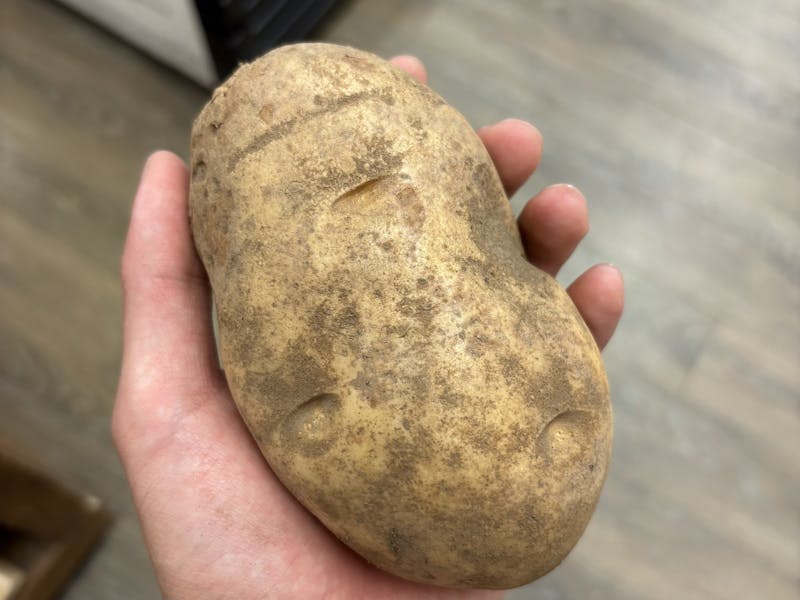
COURTESY OF JASON CHANG
Behold: the potato.

COURTESY OF JASON CHANG
Behold: the potato.
The other day, in a desperate attempt to procrastinate on my dreadfully boring report on the microstructure and nanostructure of 304L grade stainless steel (sorry, Dr. Gracias), I navigated away from the dozens of review papers on my screen and into the promised land of BuzzFeed quizzes. After a few minutes of mindlessly scrolling, a few holy pixels found their way to my eyes: a quiz promising to tell me what kind of a potato I was. I froze. Was I Yukon Gold? Fingerling? Bintje? I simply had to find out.
A few rigorous rounds of questions later — including “How would you feel as a potato?” and “What would you pair potatoes with?” — I hit submit and eagerly awaited the results. My heart raced. Sweat beaded on my forehead. I hadn’t felt this nervous since the ACTs. And for the grand reveal? I was… a russet potato. Womp womp. The most common potato in America. BuzzFeed was essentially calling me basic. Heart shattered, I dejectedly went back to typing away about austenite-ferrite transformations.
But here’s the thing: Why do I even care? Why am I (and don’t lie, so are many of you as well) so drawn to these silly online quizzes, horoscopes or MBTI types? After all, we all know on some logical level that they are meaningless. We’re the generation that grew up hearing over and over again that people don’t fit into neat little boxes — that labels are limiting and every one of us is unique. Yet time and time again, we keep crawling back to the very categories that we claim to reject.
The truth is, boxes aren’t always so bad. Yes, they can be suffocating, but they can also be comforting. Think of your cat, who insists on squeezing herself into a tiny cardboard box while the plush $90 cat bed you bought her (with adaptive heating technology!) lies barren right beside it. Or think of us, returning each night to hole up in our own four walls. Boxes, for all their limits, make us feel contained, grounded and safe.
What’s more, sometimes it feels good to be categorized, or to be given a label that just makes sense. From Harry Potter houses to sports teams, it can feel good to fit in and belong to a clearly defined group. It can help make us feel seen; we feel like something or someone sees us for who we are and has decided that we fit. It doesn’t matter where, just at least somewhere — even if it’s a silly little digital quiz running a simple algorithm to decidedly declare us an “empathetic lampshade.” In a world that often feels lonely, there’s a small warmth in recognizing yourself in a few lines of text and thinking, “Hey, that does kinda sound like me!”
When my middle school teacher made us take the Myers-Briggs personality test, I landed as an INFJ: the advocate. And while even back then I knew the test was largely pseudoscience, it made me feel special when a Google search declared INFJ as the rarest personality type. It helped a lost, lonely little kid feel a puff of pride to know there was a group somewhere he belonged to.
And there’s truth in that comfort. Research shows that constraints can enhance creativity and boost productivity. Boundaries can help us focus. Boxes can give us form — they can shape, rather than trap.
But the trick is knowing when to climb out. Boxes are meant to be a temporary shelter of comfort, not a permanent home. They hold us when we need them and give us a place to start, yet true growth only occurs when we venture beyond them.
Take our lovely potato. What many people don’t know is that potatoes actually belong to the Solanaceae family, commonly known as nightshades. Nightshades are famous for their toxicity and potatoes are no different — the stems and leaves of wild potatoes contain potentially deadly glycoalkaloids. Yet the indigenous people of South America saw potential where others only saw poison. They learned to cultivate the plant and safely consume it as a staple food source. If they had never categorized it as poisonous in the first place, people could have fallen prey to its poison. But if they had never dared to take it beyond those simple boxes they tucked them away in, we might have never known wonders like fries, chips or tortilla de patatas.
So perhaps that’s the lesson. It is okay to find comfort in a box. We all do. But don’t let the box you reside in define the edges of your entire world. Take a lesson from the potato. After all, given enough time, even the lowly russet will grow strong roots deep enough to reach beyond the box it came in.
Jason Chang is a first-year master’s student studying Chemical and Biomolecular Engineering from Woodbury, Minn.